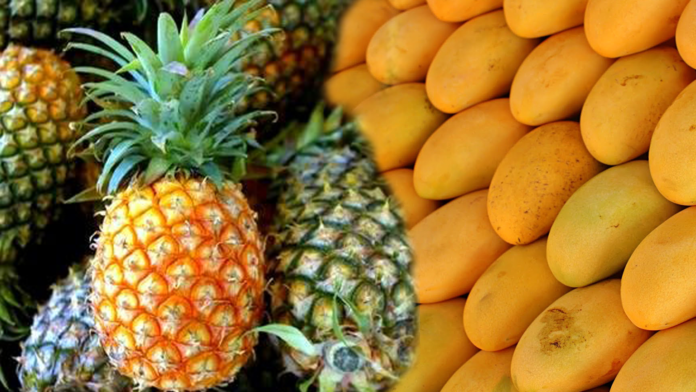-
Philippine-grown pineapples and mangoes may soon find their way through additional ports of entry in the United States
-
The Bureau of Plant Industry and the US Department of Agriculture’s Animal and Plant Health Inspection Service agreed to thresh out pending issues to allow for the export of the two fruits to the US
-
“ePhyto” certification is being pushed to replace official documents issued by governments to confirm that shipments of plants and plant products traded internationally are free of pests and diseases, and are safe to import
-
The BPI and APHIS panels also discussed access to the Philippine market of US fresh pomegranate exports
Philippine-grown pineapples and mangoes may soon find their way through additional ports of entry in the United States, according to the Department of Agriculture (DA).
This development came after the Philippine Bureau of Plant Industry (BPI) and the US Department of Agriculture’s Animal and Plant Health Inspection Service (USDA-APHIS) during a virtual meeting on August 12, 2021 agreed to thresh out pending issues to allow for the export of the two fruits.
“Expanding the export market of Philippine pineapples and mangoes in the US and other countries will not only enhance our national economy, but more importantly, provide increased incomes to thousands of farmers and their families in pineapple- and mango-producing provinces nationwide,” Agriculture Secretary William Dar said in a statement.
With the agreement, the Philippines could dramatically increase exports of pineapples and resume shipments of mangoes to the US via additional ports of entry, DA noted.
According to BPI, Philippine fresh pineapples currently reach the US through Guam, Commonwealth of Marianas Island, and North Atlantic regions. From 2013 to July 15, 2021, exports amounted to only 346,190 kilograms.
The country also previously exported fresh mangoes produced from Guimaras Island to the US, from 2005 to 2008, totaling 386,099 kg.
In a report to Dar, BPI National Plant Quarantine Services Division officer-in-charge chief Joselito Antioquia said the APHIS has accepted evidence that the “smooth cayenne”—the Philippines’ main export pineapple variety—is not a host to the oriental fruit fly.
The fruit pest, known scientifically as Bactroceradorsalis (Hendel), is very destructive and often finds its way into the US, sometimes triggering wide-scale eradication programs.
APHIS is the main US agency that protects animal health, animal welfare, and plant health. It is also the lead agency that collaborates with other agencies to protect US agriculture from invasive pests and diseases.
Antioquia said APHIS will provide BPI the risk mitigation measures for oriental fruit fly. After the BPI agrees on the measures, APHIS will publish the initial notice in the Federal Register for a 60-day stakeholder comment period, review any comments, and then publish the final notice that allows the expanded market access for Philippine pineapples into the US, except Hawaii.
The Philippines may start shipping pineapples to various US markets before yearend, Antioquia added.
The APHIS also agreed to draft an operational work plan (OWP) on the irradiation of Philippine fresh mangoes after these arrive in the US. The BPI will then provide APHIS official comments on the OWP.
Irradiation is a phytosanitary treatment that uses ionizing radiation to prevent the introduction or spread of regulated pests by achieving mortality, preventing successful development like non-emergence of adults, sterility or inactivation. Irradiation of mangoes upon arrival in the US is an option offered by the USDA in response to the request of the Philippines to remove pre-clearance inspection.
Another development seen to make agricultural exports to the US much easier is the country’s inclusion in the “ePhyto Hub” organized by the International Plant Protection Convention (IPPC).
The “ePhyto” certification, which is also being pushed by the US, will replace official documents issued by governments, with electronic forms to confirm that shipments of plants and plant products traded internationally are free of pests and diseases, and are therefore safe to import.
DA noted that traditionally, certificates are done on paper and transmitted between parties by post, courier, or other physical means. The process takes days to complete, and is prone to errors, loss, theft, and counterfeiting. Thus, it slows down trade and, at worst, results in spoiled goods, additional demurrage charges, and frustrated customers and governments.
BPI is in the process of developing the system to connect to the IPPC “ePhyto Hub,” said Antioquia.
The BPI and APHIS panels also discussed the latter’s request for access of US fresh pomegranate exports to the Philippine market.
Antioquia said the BPI has already narrowed the pest list scope for pomegranate to top state producers like California, Arizona, New Mexico, and Texas. The US request is still in the initial pest risk analysis stage, and it will take three to six months to complete the risk assessment part.
In 2019, the US imported various Philippine farm products, totaling $924 million, led by tropical oils ($353 million), processed fruit and vegetables ($165 million), fruit and vegetable juices ($112 million), tree nuts ($92 million), and raw beet and cane sugar ($36 million). Coconut (oil and other products), fish and marine products, sugar and pineapples are the country’s major exports to the US.





